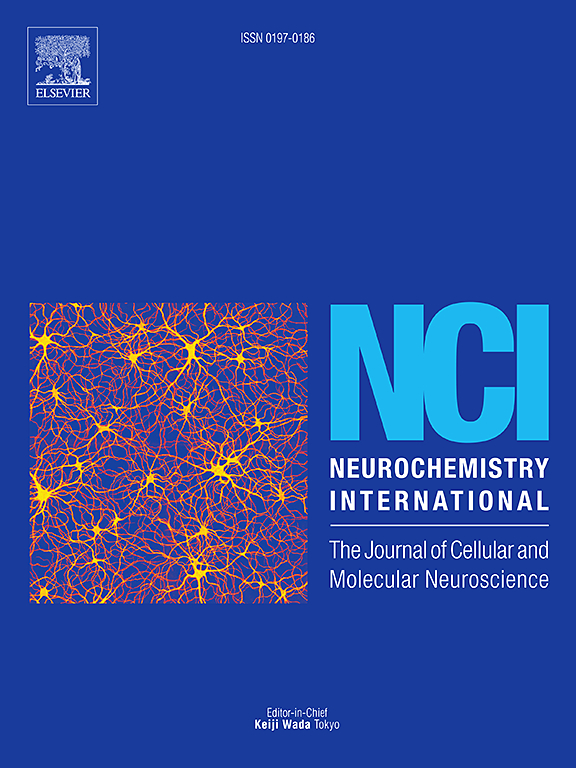The novel peptide DBCH reduces LPS-stimulated NF-κB/MAPK signaling in BV-2 microglia and ameliorates cognitive impairment in scopolamine-treated mice by modulating BDNF/CREB
IF 4
3区 医学
Q2 BIOCHEMISTRY & MOLECULAR BIOLOGY
引用次数: 0
Abstract
Microglial-mediated neuroinflammation significantly impacts cognitive impairment, and modulating neuroinflammatory responses has emerged as a promising target for treatment. However, the specific role of microglial-mediated neuroinflammation in cognitive impairment associated with Alzheimer's disease (AD) remains unclear. In our continuous endeavors to seek potent anti-Alzheimer's agents, we recently synthesized and developed a series of peptidomimetic compounds, including dipeptide-68 bis-cyclohexylpropyl histidinamide (DBCH), derived from a caryopsis-1 peptide that has demonstrated anti-inflammatory and anti-microbial properties in various infectious diseases. Among the bioactive peptides synthesized, DBCH exhibited good neuroprotective and anti-inflammatory activity and high potency. Therefore, in this study, the neuroprotective and anti-inflammatory effects of DBCH were assessed in lipopolysaccharide (LPS)-stimulated BV-2 microglial cells and a scopolamine-induced C57BL/6 N amnesic mouse model. In the in vitro study, DBCH effectively suppressed the production and expression of nitric oxide (NO) and proinflammatory cytokines in BV-2 microglial cells stimulated with LPS. Furthermore, it effectively inhibited the LPS-triggered phosphorylation and activation of NF-κB/MAPK signaling and modulated inflammatory mediators, including iNOS and COX-2, in BV-2 microglial cells. In vivo results showed that DBCH administration of 5 or 10 mg/kg improved spatial memory learning and cognitive function in scopolamine-induced amnesic mice. Furthermore, DBCH treatment upregulated phosphorylated cAMP-response element-binding protein (p-CREB) and brain-derived neurotrophic factor (BDNF) levels and downregulated the inflammatory response. Overall, DBCH effectively prevented both scopolamine-induced cognitive impairment and neuroinflammation. Our research findings suggest that DBCH may serve as a medication for cognitive decline associated with AD.
新型肽DBCH可降低lps刺激的BV-2小胶质细胞中NF-κB/MAPK信号,并通过调节BDNF/CREB改善东莨菪碱处理小鼠的认知障碍。
小胶质细胞介导的神经炎症显著影响认知障碍,调节神经炎症反应已成为治疗的一个有希望的目标。然而,小胶质细胞介导的神经炎症在阿尔茨海默病(AD)相关认知障碍中的具体作用尚不清楚。在我们不断努力寻找有效的抗阿尔茨海默病药物的过程中,我们最近合成并开发了一系列拟肽化合物,包括二肽-68双环己基丙基组氨酸(DBCH),该化合物来源于一种核桃树-1肽,在各种传染病中显示出抗炎和抗微生物特性。在合成的生物活性肽中,DBCH具有良好的神经保护和抗炎活性,效力高。因此,本研究在脂多糖(LPS)刺激的BV-2小胶质细胞和东莨菪碱诱导的C57BL/6N失忆小鼠模型中,评估了DBCH的神经保护和抗炎作用。在体外研究中,DBCH可有效抑制LPS刺激的BV-2小胶质细胞一氧化氮(NO)和促炎细胞因子的产生和表达。此外,它还能有效抑制lps触发的NF-κB/MAPK信号的磷酸化和激活,并调节BV-2小胶质细胞中的炎症介质,包括iNOS和COX-2。体内实验结果显示,5或10 mg/kg DBCH可改善东莨菪碱诱导的遗忘小鼠的空间记忆学习和认知功能。此外,DBCH治疗上调磷酸化camp反应元件结合蛋白(p-CREB)和脑源性神经营养因子(BDNF)水平,下调炎症反应。总体而言,DBCH有效地预防了东莨菪碱引起的认知障碍和神经炎症。我们的研究结果表明,DBCH可能是一种治疗AD相关认知能力下降的药物。
本文章由计算机程序翻译,如有差异,请以英文原文为准。
求助全文
约1分钟内获得全文
求助全文
来源期刊

Neurochemistry international
医学-神经科学
CiteScore
8.40
自引率
2.40%
发文量
128
审稿时长
37 days
期刊介绍:
Neurochemistry International is devoted to the rapid publication of outstanding original articles and timely reviews in neurochemistry. Manuscripts on a broad range of topics will be considered, including molecular and cellular neurochemistry, neuropharmacology and genetic aspects of CNS function, neuroimmunology, metabolism as well as the neurochemistry of neurological and psychiatric disorders of the CNS.
 求助内容:
求助内容: 应助结果提醒方式:
应助结果提醒方式:


